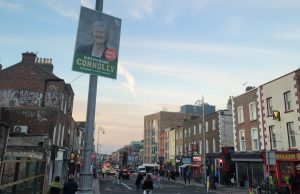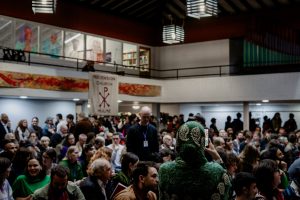
How do we build revolutionary organisation?
rs21 members •To end the barbarity of capitalism we need revolution, and to win revolution we need a revolutionary organisation. Developing that organisation requires political clarity – finding out which ideas are most effective in leading struggles, through debate and in practice. A group of rs21 members respond to the recent article by the Marxist Unity Caucus.
rs21 members are debating what strategy we need to pursue, but we agree on the need for revolution and to build a mass revolutionary organisation. Only through revolution do workers have the power to defeat the ruling class, but revolution is also necessary for a second reason, as Marx explains:
Both for the production on a mass scale of this communist consciousness, and for the success of the cause itself, the alteration of men (sic) on a mass scale is necessary, an alteration which can only take place in a practical movement, a revolution; this revolution is necessary, therefore, not only because the ruling class cannot be overthrown in any other way, but also because the class overthrowing it can only in a revolution succeed in ridding itself of all the muck of ages and become fitted to found society anew. (The German Ideology)
Examples of such changes are seen in many revolutionary situations and those of mass collective action. Russian workers in 1917 rejected deep-rooted antisemitism to elect Trotsky as chair of the Petrograd soviet. Revolts in over 125 American cities after Martin Luther King was assassinated in 1968 were the precursor of the Stonewall Rebellion the following year.
Changes in consciousness are necessary if we’re to achieve not merely a political revolution, which changes a state’s rulers, but a social revolution, which replaces a capitalist society with a socialist one. The distinction is crucial. Political revolutions are frequent – by one calculation, one took place every 4.1 years between 1985 and 2014 (see Barker, Dale, Davidson, Revolutionary Rehearsals in the Neoliberal Age, p. 5). In the post-war period, such revolutions were often associated with anti-colonial struggles. While they ended colonisation they did not establish socialism, but instead created new centres for capital accumulation in the former colonies. Meanwhile only one social revolution, that of Russia in October 1917, has been successful, and even that for only a few years.
The development of a mass revolutionary party is vital to the process of social revolution, as a place where strategy can be debated and decisions to take action are reached democratically and put into effect. It is essential in the struggle against other currents within a revolution who argue for half measures – an approach that paves the way for counter revolution. It’s only through such coordination that we have any chance against the economic, ideological and military power of the ruling class. It’s only through such organisation that we can make real the perception that ‘the emancipation of the working class must be the act of the working class’, that we can achieve ‘socialism from below’ as opposed to a fake ‘socialism from above’ brought by MPs or Soviet tanks.
How do we build such an organisation? A small organisation will mostly win support through its ideas. A large organisation will mostly win support by what it does. Most organisations are in the middle – we try to be among the best activists, and also to win people over by convincing them that our ideas are the best guide to action. The struggle for political clarity is therefore vital. This involves debating through the views and experiences of an organisation’s members and trying them out in practice.
How do these general principles apply at the moment? On the one hand, while far left organisations are small, there is an audience for our ideas in the hundreds of thousands. In Britain 130,000 people took part in the Black Lives Matter protests. 800,000 marched on the largest Palestine demo. 60,000 people took part in London Trans+ Pride last year, and dozens of protests against the recent Supreme Court ruling were held at short notice around Britain, with 25,000 joining the march in London. According to polling for Channel 4, 33% of 45-65 year olds and 47% of 13-27 year olds agree that ‘the entire way our society is organised must be radically changed through revolution’. It’s not surprising that many people want radical change, and some look to the radical left, when NHS waiting lists remain at record levels and rising house prices have put good quality, secure housing out of reach for millions.
On the other hand, if there is an audience for the far left, we are also nowhere close to the early 1970s, when a miners’ strike brought down a Tory government in 1974 and many revolutionaries believed a social revolution was only years away. Union organisation built up over decades was smashed in the 1980s, especially in the miners’ strike. Whole areas of life from education and housing to work and welfare have been restructured along competitive, neoliberal lines. The far left has been key to building huge protests – the Socialist Workers Party (SWP) played a central role in organising the biggest demo in British history in 2003, but the anti-war movement didn’t stop the war.
The last 18 months have seen huge demos in support of Palestine, as well as actions by many local groups and militant protests – but the awful truth is that the genocide continues. We haven’t seen a major victory since 1990, when protests and riots in the spring defeated the Poll Tax and contributed to Thatcher’s resignation in November. Union membership meanwhile fell in 2024 to 22% of employees, compared with 32.4% in 1995 and 53% in 1979. The number of days of strike action has risen somewhat from the very low levels of six to ten years ago, but the wave of pay strikes in 2022-23 has definitely ended and major strikes are few. While there is widespread opposition to government initiatives like cuts to the pensioners’ winter fuel allowance, they haven’t brought large numbers onto the streets.
So, while there are hundreds of thousands of working-class people who agree with some radical left ideas and may join protests, they don’t often look at their work colleagues or neighbours and see people capable of defeating managers at work, landlords at home, or of combatting the state and bringing about a transformed, socialist society. They are desperate for radical left change, but lack confidence to make it themselves, and so look to others to bring about change on their behalf, from above, through reformism – a major factor in 370,000 people joining the Labour Party around Corbyn, a movement which quickly collapsed once he was no longer Labour leader. Some of these people will be won to revolution by ideas alone, but most of them will need to see workers’ struggles winning in practice to believe revolution is possible.
There is a sharp contradiction in our current position. The need for urgent action is very plain – to end the genocide in Palestine, to tackle the accelerating climate crisis, or to prevent a Reform government which will have terrible consequences for all of us, especially for migrants and trans people. The current political situation is volatile, with the Tories, the most successful ruling class party in the world, in what may be a permanent crisis, and Labour support cratering as Starmer lurches to the right. The situation may lead to an explosion. None of the major revolutionary upsurges such as 1917 or 1968 were foreseen.
But we can’t count on an upsurge, any more than it’s sensible to plan your personal finances around the hope that you might find money in the street. We need to set about rebuilding patiently, as a process which will at worst take some years, but also expecting that major events will knock us off course and may provide opportunities. Patient building is the best way to be prepared for the unexpected. For all that, the tension between such building and the need we all feel for urgent action is wrenching.
What strategy should an organisation like rs21 adopt in this situation? The comrades in MUC agree with everyone in rs21 that our ultimate goal is to be part of a movement that ends capitalism, which organises in workplaces and communities with the goal, finally, of confronting the state. If we are to do this we need to take ourselves seriously, and to clarify our ideas. As part of this process of clarification they have formed a caucus to make their case openly and democratically. They propose internal organisational changes to take some of this forward – for example, they want the leadership to be quicker at making minutes of leadership meetings available to members, who have the right to attend those meetings as observers, we should improve our political education for members, and branches should develop strategies. All of this is to be welcomed.
Where debate in rs21 has centred is on further MUC proposals for ‘regroupment’, which is a proactive process of ‘active engagement between existing Marxist organisations’, which aims to achieve ‘principled joint work in the medium-term, and unity in the long-term’. This process would involve members of different organisations engaging at the grassroots, for example through political dialogue in local forums. This process would address the fragmentation of the far left and the unnecessary weakness to which it leads, and would allow the left to grow quickly, providing an alternative to ‘incremental recruitment to… fragmented groups’. The revolutionary party which would emerge from this process would ‘unite around a common programme as a basis for action, but… needs to be capable of containing different theoretical tendencies and political traditions, and… to be able to air our disagreements in a healthy and productive way.’ Adherence to the agreed programme would be a condition for a group joining the party.
Now, the division of the far left into many small organisations, on the basis of what can seem abstruse differences, invites the kind of mockery it got in Life of Brian. Sectarianism and organisational conservatism – all party organisation generates some adherence to familiar ideas and structures – can play a part in this. We need to recognise that there are talented and comradely people in all the groups, despite our political differences. Often, people have ended up in a group because it was the first one they came across, not after some careful comparison. And we should reject an approach of loftily ignoring the rest of the left, or depicting any criticism or discussion of other far left groups as ‘sectarian’. In any case, members of rs21 should and do work with members of other organisations in many situations, including unions and campaigns such as those defending Palestine.
But there are also genuine and relevant differences at stake. The Socialist Party argues that the way forward in Palestine is for Israeli and Palestinian workers to unite. Counterfire promotes transphobic ideas. These are urgent current issues. Nor are we just looking at ideas – both the SWP and Counterfire have relationships with trade union officialdom on which projects like Stand Up to Racism and Stop the War respectively depend, both in terms of funding and political credibility. These differences in ideas and material interests make the kind of left regroupment MUC proposes difficult. Organisations’ leaderships have no reason to engage with it, and there is no sign of any significant pressure from members on their leaderships to change their position.
We also need to be clear that what we are seeking to build is a party of revolutionaries. MUC refers to realignment with ‘Marxist organisations’, which is not the same thing. People and organisations with various different political stances refer to themselves as Marxists. There are those who stand in Stalinist traditions quite different from those of us who see workers’ self-activity as key to bringing about socialism. There are academic Marxists, some of whom do nothing in the way of activism or can even promote ideas which hold activism back. There are those who accept some Marxist ideas while acting as reformists in practice. Both Stalinist and reformist traditions have proved counter revolutionary in many countries and periods. The central question is whether groups or individuals are building struggles of the working class and the oppressed and trying to develop them in a revolutionary direction, not whether they regard themselves as Marxist.
MUC’s focus on left realignment also implies that a key task we face is to relate to other small left groups. We are concerned that this reduces the time and energy members have for building revolutionary organisation or relating to people in our workplaces and communities, including those who haven’t been involved in the radical left so far. Working with those outside the far left is important – these are the people we believe are capable of making a socialist revolution, so our members need to develop our ability to relate to them and win them to joint activity and to our ideas. And it’s not just about us passing on ideas to passive listeners – we also have things to learn from them, as the recent website article about defending trans colleagues at work demonstrated. So, when we debate with other far left groups, our focus should be on how we defeat the enemy – bosses, landlords, BP, Farage, Starmer etc. – and discussing with people around us, with those not yet involved, how to win. This is a different approach from seeking to win members from other left groups through debates with them that are disconnected from struggle.
What about MUC’s proposal for a multi-tendency organisation united around a common programme? Certainly there is more scope for diversity in a revolutionary party outside of a revolutionary period than is allowed in organisations based on an understanding of democratic centralism like the one the SWP has. But the multi-tendency nature of the proposed party seems to imply that disagreements become associated with fixed blocs inside the organisation, so institutionalising semi-permanent conflict rather than allowing issues to be resolved. It is hard to see how the programme would work to unify the organisation. There would be the risk that it contained so little as to be ineffective. There is the risk that groups would formally agree to it, but that agreement wouldn’t hold when the organisation came under pressure. There are important issues which are outside the scope of such a programme – internal democracy is a key value, for example, for rs21, which was not founded and is not led by one person or a small fixed group.
So, we feel that some of MUC’s proposals make a positive contribution. We can expect mergers and splits to happen between where we are now and achieving a mass party – but we don’t think that encouraging mergers is the right focus at the moment. Again, we can be sure that a mass party would have a lively factional life. But the aim of factional debate would be either a synthesis, or testing ideas in practice to find out which were right – not accepting entrenched differences in the long term.
We feel it’s especially important to say this in the context of rs21’s current development. The organisation has grown rapidly in the last year. People have joined, inevitably with a wide range of political experiences and views. We need to debate through political differences, so as to reach as much as possible a shared understanding, rather than accepting the current status quo, of many different viewpoints coexisting – that can only lead to instability and confusion in the long run.
And, at a time when the far left faces many challenges, it can be more immediately rewarding to relate to others on the left rather than those outside it – and indeed the far left is a small pond in which we have become a middle-sized fish. But we need to remain clear that one of our key goals must be to relate to workers and oppressed people outside the organised far left, and win them to us by seeing those ideas work in practice.







0 comments